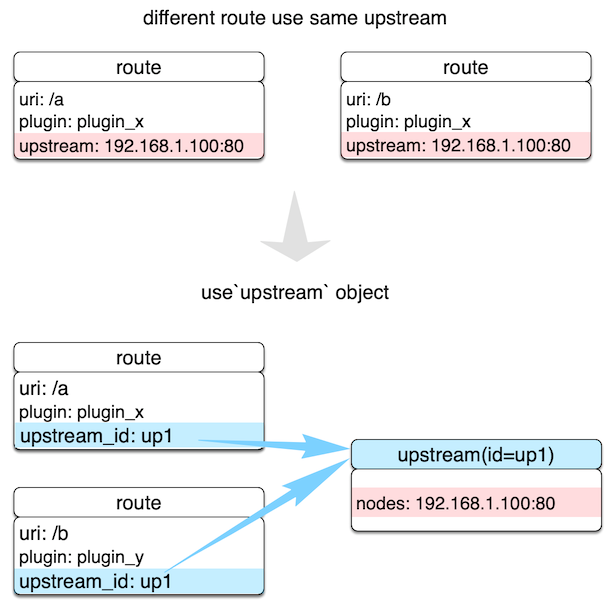Upstream
Upstream is a virtual host abstraction that performs load balancing on a given set of service nodes according to configuration rules. Upstream address information can be directly configured to Route (or Service). When Upstream has duplicates, you need to use "reference" to avoid duplication.

As shown in the image above, by creating an Upstream object and referencing it by ID in Route, you can ensure that only the value of an object is maintained.
Upstream configuration can be directly bound to the specified Route or it can be bound to Service, but the configuration in Route has a higher priority. The priority behavior here is very similar to Plugin.
Configuration#
In addition to the basic complex equalization algorithm selection, APISIX's Upstream also supports logic for upstream passive health check and retry, see this link.
Create an upstream object use case:
curl http://127.0.0.1:9080/apisix/admin/upstreams/1 -H 'X-API-KEY: edd1c9f034335f136f87ad84b625c8f1' -X PUT -d '{ "type": "chash", "key": "remote_addr", "nodes": { "127.0.0.1:80": 1, "foo.com:80": 2 }}'After the upstream object is created, it can be referenced by specific Route or Service, for example:
curl http://127.0.0.1:9080/apisix/admin/routes/1 -H 'X-API-KEY: edd1c9f034335f136f87ad84b625c8f1' -X PUT -d '{ "uri": "/index.html", "upstream_id": 1}'For convenience, you can also directly bind the upstream address to a Route or Service, for example:
curl http://127.0.0.1:9080/apisix/admin/routes/1 -H 'X-API-KEY: edd1c9f034335f136f87ad84b625c8f1' -X PUT -d '{ "uri": "/index.html", "plugins": { "limit-count": { "count": 2, "time_window": 60, "rejected_code": 503, "key": "remote_addr" } }, "upstream": { "type": "roundrobin", "nodes": { "39.97.63.215:80": 1 } }}'Here's an example of configuring a health check:
curl http://127.0.0.1:9080/apisix/admin/routes/1 -H 'X-API-KEY: edd1c9f034335f136f87ad84b625c8f1' -X PUT -d '{ "uri": "/index.html", "plugins": { "limit-count": { "count": 2, "time_window": 60, "rejected_code": 503, "key": "remote_addr" } }, "upstream": { "nodes": { "39.97.63.215:80": 1 } "type": "roundrobin", "retries": 2, "checks": { "active": { "http_path": "/status", "host": "foo.com", "healthy": { "interval": 2, "successes": 1 }, "unhealthy": { "interval": 1, "http_failures": 2 } } } }}'More details can be found in Health Checking Documents.
Here are some examples of configurations using different hash_on types:
Consumer#
Create a consumer object:
curl http://127.0.0.1:9080/apisix/admin/consumers -H 'X-API-KEY: edd1c9f034335f136f87ad84b625c8f1' -X PUT -d '{ "username": "jack", "plugins": { "key-auth": { "key": "auth-jack" } }}'Create route object and enable key-auth plugin authentication:
curl http://127.0.0.1:9080/apisix/admin/routes/1 -H 'X-API-KEY: edd1c9f034335f136f87ad84b625c8f1' -X PUT -d '{ "plugins": { "key-auth": {} }, "upstream": { "nodes": { "127.0.0.1:1980": 1, "127.0.0.1:1981": 1 }, "type": "chash", "hash_on": "consumer" }, "uri": "/server_port"}'Test request, the consumer_name after authentication is passed will be used as the hash value of the load balancing hash algorithm:
curl http://127.0.0.1:9080/server_port -H "apikey: auth-jack"Cookie#
Create route and upstream object, hash_on is cookie:
curl http://127.0.0.1:9080/apisix/admin/routes/1 -H 'X-API-KEY: edd1c9f034335f136f87ad84b625c8f1' -X PUT -d '{ "uri": "/hash_on_cookie", "upstream": { "key": "sid", "type ": "chash", "hash_on ": "cookie", "nodes ": { "127.0.0.1:1980": 1, "127.0.0.1:1981": 1 } }}'The client requests with Cookie:
curl http://127.0.0.1:9080/hash_on_cookie -H "Cookie: sid=3c183a30cffcda1408daf1c61d47b274"Header#
Create route and upstream object, hash_on is header, key is Content-Type:
curl http://127.0.0.1:9080/apisix/admin/routes/1 -H 'X-API-KEY: edd1c9f034335f136f87ad84b625c8f1' -X PUT -d '{ "uri": "/hash_on_header", "upstream": { "key": "content-type", "type ": "chash", "hash_on ": "header", "nodes ": { "127.0.0.1:1980": 1, "127.0.0.1:1981": 1 } }}'The client requests with header Content-Type:
curl http://127.0.0.1:9080/hash_on_header -H 'X-API-KEY: edd1c9f034335f136f87ad84b625c8f1' -H "Content-Type: application/json"